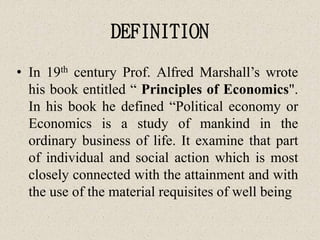The term entrepreneur is defined in a variety of ways. Welfare economics forms an important part of microeconomics Microeconomics Microeconomics is a bottom-up approach where patterns from everyday life are pieced together to correlate demand and supply.

Alfred Marshall From The Concise Encylopedia Of Economics Ppt Video Online Download
And bread being still the cheapest food which they can get and will take.

. He believed it was not a natural science such as physics or chemistry but rather a social science. Thus it is on the one side. Specifically Marshalls view is that economics studies all the actions that people take in order to achieve economic welfare.
As MrGiffen has pointed out a rise in the price of bread makes so large a drain on the resources of the poorer labouring families and raises so much the marginal utility of money to them that they are forced to curtail their consumption of meat and the more expensive farinaceous foods. This definition expands the field of economic science to a larger study of humanity. British economist Alfred Marshall defined economics as the study of man in the ordinary business of life.
Marshalls book Principles of Economics 1890 is one of the most influential textbooks in the history of economic thought. A Giffen good has an upward-sloping demand curve which is contrary to. Marshall argued that the subject was both the study of wealth and the study of mankind.
Estimation of such effects has been a primary focus of empirical economics from the earliest years of econometrics Disciplines lacking natural models invented new oneseg the PO frameworkRubin causal model or the DAGSCM models of Pearlto define. This concept central to economics since Alfred Marshall. Yet no consensus has been arrived at on the precise skills and abilities that make a person a.
Read more that analyses the impact of resource allocation and economic policies and actions on the well-being of people. Microeconomics is the social science that studies the implications of individual human action specifically about how those decisions affect the utilization and distribution of scarce resources. Alfred Marshalls inclusion of the expression wellbeing was also very significant to the discussion on the nature of economics.
In the words of Marshall man earns. Alfred Marshall 1842-1924 was an English economist who is widely considered to be the father of modern neoclassical economics. Definition and Laws of Economics.
Second nature to economists. Marshall defined Economics as Political Economy or Economics is a study of mankind in the ordinary business of life. The welfare definition of economics is an attempt by Alfred Marshall a pioneer of neoclassical economics to redefine his field of study.
Alfred Marshalls Definition of Economics. It examines that part of individual and social action which is most closely connected with the attainment and with the use of material requisites of well-being. Entrepreneur Meaning and Definition Definitions of Entrepreneur According to Bernard Belidor Jean Baptiste Jan Tinbergen Adam Smith Alfred Marshall Joseph A.
Political Economy or Economics is a study of mankind in the ordinary business of life. It examines that part of individual and social action which is most closely connected with the attainment and with the use of the material requisites of wellbeing. Francis Ysidro Edgeworth 1845-1926 was an Anglo-Irish economist and philosopher.
A Giffen good is a good for which demand increases as the price increases and falls when the price decreases. Edgeworth was one of.

Notes On Economics The Definition And Scope Karnataka Board Class 8 Economics

How Do Economists Define Economics Economaldives Error 404 Economaldives

Marshall S Definition Of Economics

Definition Of Economics By Alfred Marshall Neoclassical Economist Rm Hindhi Urdu 1 Youtube
0 Comments